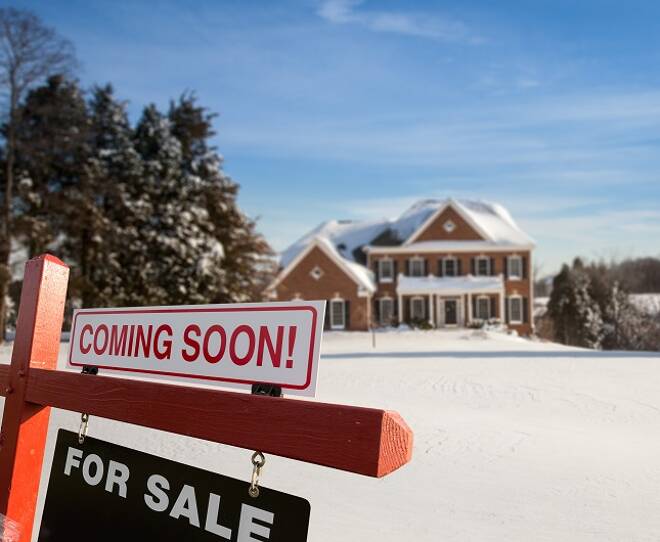Advertisement
Advertisement
U.S Mortgage Rates Rise for a 6th Consecutive Week
By:
Mortgage rates were on the rise once more last week. The upward trend in rates and home prices is beginning to take effect on refinancing and demand.
Mortgage rates were on the rise for a 6th consecutive week in the week ending 25th March. Following a 4-basis points rise from the week prior; 30-year fixed rates rose by a further 8 basis points to 3.17%.
Compared to this time last year, 30-year fixed rates were down by just 33 basis points.
30-year fixed rates were still down by 177 basis points, however, since November 2018’s last peak of 4.94%.
Notably, it was just the fourth plus 3% week since July of last year and the highest rate since 10th June 2020, where 30-year fixed rates had stood at 3.21%.
Economic Data from the Week
It was a relatively quiet first half of the week on the U.S economic calendar.
On the economic data front, private sector PMIs and core durable goods orders for February and March were in focus
It was a mixed set of numbers in the week.
According to prelim figures, both manufacturing and service sector activity picked up in March.
The all-important services PMI increased from 59.8 to 60.0, with the manufacturing PMI rising from 58.6 to 59.0.
On the negative, however, was an unexpected fall in core durable goods orders and durable goods orders.
In February, core durable goods orders fell by 0.9%, with durable goods orders falling by 1.1%, month-on-month.
While the stats were mixed, FED Chair Powell delivered Dollar a strength and a pickup in U.S Treasury yields during 2-days of testimony to lawmakers.
Powell is finding it hard to talk down the U.S economy following the FOMC projections.
Freddie Mac Rates
The weekly average rates for new mortgages as of 25th March were quoted by Freddie Mac to be:
- 30-year fixed rates increased by 8 basis points to 3.17% in the week. This time last year, rates had stood at 3.50%. The average fee held steady at 0.7 points.
- 15-year fixed rates rose by 5 basis points 2.45% in the week. Rates were down by 47 basis points from 2.92% a year ago. The average fee fell from 0.7 points to 0.6 points.
- 5-year fixed rates also rose by 5 basis points 2.84%. Rates were down by 50 points from 3.34% a year ago. The average fee fell from 0.3 points to 0.2 points.
According to Freddie Mac,
- During the course of the pandemic, the home has become more important than ever. This has driven strong demand, with buyers outnumbering sellers.
- Since January, mortgage rates have increased half a percentage point from historical lows and home prices have risen.
- This has left potential homebuyers with less purchasing power.
- Unfortunately, this has disproportionately affected the low end of the market, where supply is the slimmest.
Mortgage Bankers’ Association Rates
For the week ending 19th March, the rates were:
- Average interest rates for 30-year fixed to conforming loan balances increased from 3.28% to 3.36%. Points increased from 0.41 to 0.42 (incl. origination fee) for 80% LTV loans.
- Average 30-year fixed mortgage rates backed by FHA increased from 3.25% to 3.35%. Points rose from 0.38 to 0.41 (incl. origination fee) for 80% LTV loans.
- Average 30-year rates for jumbo loan balances increased from 3.34% to 3.40%. Points increased from 0.40 to 0.43 (incl. origination fee) for 80% LTV loans.
Weekly figures released by the Mortgage Bankers Association showed that the Market Composite Index, which is a measure of mortgage loan application volume, decreased by 2.5% in the week ending 19th March. In the previous week, the index had fallen by 2.2%.
The Refinance Index decreased by 5% from the previous week and was 13% lower than the same week a year ago. The index had fallen by 4% in the week prior.
In the week ending 19th March, the refinance share of mortgage activity decreased from 62.9% to 60.9%. In the previous week, the share had fallen from 64.5% to 62.9%.
According to the MBA,
- Mortgage rates have now risen 50 basis points since the beginning of the year, shutting off refinance incentives for many borrowers.
- Refinance activity dropped to its slowest pace since September 2020.
- Mortgage rates have moved higher in tandem with Treasury yields, as the outlook for the U.S economy continues to brighten.
- Faster vaccines and an easing of pandemic-related restrictions have supported the more bullish outlook.
- Purchase applications were strong over the week. Households seeking more living space and younger households looking to enter the market drove demand.
- The purchase index increased for a 4th consecutive week and was up 26% from last year’s pace.
- Loan sizes were also on the rise once more.
For the week ahead
It’s another relatively quiet first half of the week on the U.S economic calendar once more. Key stats include consumer confidence and ADP Nonfarm employment change figures for March.
The markets are bullish now about the U.S economy. So, a deterioration in consumer confidence and labor market conditions could derail that outlook.
All-in-all, however, the numbers would need to be dire to shift sentiment and materially hit mortgage rates.
From elsewhere, private sector PMIs from China will also draw interest.
Geopolitical risk is also back on the table as China retaliates, targeting major western brand names…
About the Author
Bob Masonauthor
With over 28 years of experience in the financial industry, Bob has worked with various global rating agencies and multinational banks. Currently he is covering currencies, commodities, alternative asset classes and global equities, focusing mostly on European and Asian markets.
Advertisement
